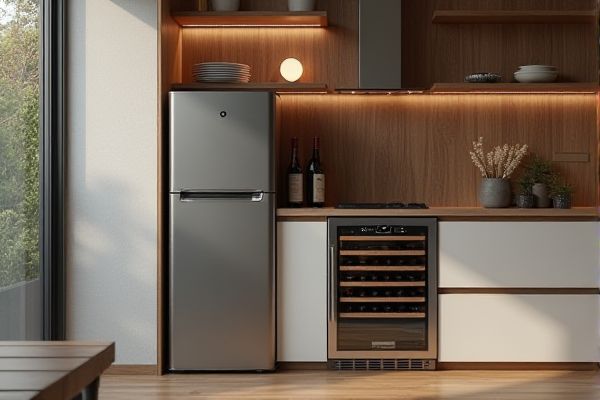
A mini fridge offers versatile cooling for various beverages and snacks, while a wine cooler is specifically designed to maintain optimal temperature and humidity for preserving wine quality. Discover which option best suits your lifestyle and needs by reading the rest of the article.
Table of Comparison
| Feature | Mini Fridge | Wine Cooler |
|---|---|---|
| Purpose | General food and beverage storage | Optimal wine storage and aging |
| Temperature Range | 32degF to 50degF (0degC to 10degC) | 45degF to 65degF (7degC to 18degC) |
| Humidity Control | None or minimal | Maintains ideal humidity (~50-80%) |
| Storage Capacity | Varies, generally 1.7 to 4.5 cubic feet | Typically 6 to 50 bottles |
| Cooling System | Compressor or thermoelectric | Usually thermoelectric for vibration-free cooling |
| Vibration | Possible vibrations | Minimal vibrations to protect wine sediment |
| Price Range | $100 - $400 | $150 - $1000+ |
| Ideal User | General users needing compact refrigeration | Wine enthusiasts and collectors |
Introduction: Mini Fridge vs Wine Cooler
A mini fridge offers versatile storage for beverages and snacks with adjustable temperature settings, while a wine cooler is specifically designed to maintain optimal humidity and temperature for preserving wine quality. Wine coolers feature specialized racks and controlled environments that protect your collection from heat and light damage. Choosing between a mini fridge and a wine cooler depends on whether you prioritize multi-purpose use or dedicated wine storage for your needs.
Key Differences Between Mini Fridge and Wine Cooler
A mini fridge offers versatile storage for various beverages and snacks with adjustable temperature settings, while a wine cooler is designed specifically to maintain optimal conditions for wine preservation, including humidity control and vibration reduction. Mini fridges typically operate at higher temperatures and lack temperature zoning, unlike wine coolers that provide precise, lower temperature ranges tailored for red and white wines. The interior design of wine coolers includes specialized racks to prevent bottle movement, contrasting with the flexible shelving inside mini fridges suitable for different container sizes.
Temperature Control and Stability
Mini fridges often have limited temperature control and may struggle to maintain a consistent environment, which can impact the quality of stored beverages. Wine coolers offer precise temperature settings and better stability, typically ranging between 45degF and 65degF, ideal for preserving wine's flavor and aging process. Your choice should prioritize temperature accuracy and consistency to ensure optimal storage conditions for your drinks.
Storage Capacity and Design
Mini fridges typically offer versatile storage with capacities ranging from 1.7 to 4.5 cubic feet, accommodating various food and beverage items, while wine coolers specialize in temperature-controlled storage designed specifically for wine bottles, often holding between 12 to 50 bottles. The design of mini fridges emphasizes compactness and multifunctionality, featuring adjustable shelves and door compartments, whereas wine coolers prioritize horizontal or angled bottle racks to maintain cork moisture and optimize aging conditions. Choosing between the two depends on the need for general refrigeration space versus a dedicated, temperature-stabilized environment tailored for preserving wine quality.
Energy Efficiency Comparison
Mini fridges typically consume more energy than wine coolers due to their broader temperature range and frequent internal temperature adjustments. Wine coolers are engineered to maintain a stable temperature optimized for wine storage, resulting in lower energy usage and enhanced energy efficiency ratings. Choosing a wine cooler over a mini fridge can significantly reduce power consumption, especially models with Energy Star certification.
Best Uses for Mini Fridges
Mini fridges excel at storing a variety of beverages, snacks, and perishables, making them ideal for dorm rooms, offices, and small apartments. Their compact size and versatile shelving accommodate diverse items such as soda cans, fruits, and leftovers, ensuring convenient access to everyday essentials. Your choice of a mini fridge supports efficient space use and general cooling needs beyond the specialized temperature control of a wine cooler.
Ideal Uses for Wine Coolers
Wine coolers are specifically designed to maintain optimal temperature and humidity levels for preserving wine quality, making them ideal for aging and serving various wine types. Unlike mini fridges, wine coolers feature vibration reduction technology and UV-resistant glass to protect delicate wine flavors and aromas. Your collection benefits from precise climate control, ensuring every bottle is stored under ideal conditions for long-term enjoyment.
Pros and Cons of Mini Fridges
Mini fridges offer compact, versatile cooling solutions ideal for small spaces and affordable refrigeration of various beverages and snacks. They often consume less energy but lack specialized temperature controls crucial for preserving wine quality compared to wine coolers. However, mini fridges may cause inconsistent cooling and vibration that can negatively affect delicate wine storage.
Advantages and Disadvantages of Wine Coolers
Wine coolers maintain optimal temperature and humidity levels specifically designed to preserve wine quality, preventing spoilage and aging issues. However, their specialized function means they typically offer less storage flexibility and higher cost compared to mini fridges. If you prioritize perfect wine storage, a wine cooler enhances your collection, but for general use, your money might go further with a versatile mini fridge.
Which Is Right for You: Mini Fridge or Wine Cooler?
Choosing between a mini fridge and a wine cooler depends on your specific storage needs and beverage preferences. Mini fridges offer versatile temperature settings suitable for various drinks and snacks, while wine coolers provide optimal humidity and precise temperature control to preserve wine quality and flavor. Consider your primary use--general cooling or dedicated wine storage--to select the best appliance for your lifestyle and collection.
 homyna.com
homyna.com